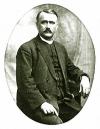Biography
Other info : Bibliography
Gjergj Fishta was an Albanian Franciscan friar, poet, rilindas, and a translator. Notably he was the chairman of the commission of the Congress of Monastir, which sanctioned the Albanian alphabet.In 1921 he became the Vice President of the Albanian parliament. In 1937 he completed and published his epic masterpiece Lahuta e Malcís, an epic poem written in Gheg dialect of Albanian. It contains 17,000 lines and is considered the "Albanian Iliad".[1] Gjergj Fishta was the first[1] Albanian candidate for the The Nobel Prize in Literature.[2][3]
Born in Fishtë, Dajç (otherwise called Zadrimë), Lezhë, Albania (then Ottoman Empire), Fishta studied philosophy and Catholic theology in Bosnia (seminaries in Kraljeva Sutjeska, Livno, Kreševo), among Bosnian Croats.[4] In 1902, he became the head of the Franciscan gymnasium in Shkodër (Collegium Illyricum).[4] Fishta was under influence of Croatian Franciscan monks as a student in monasteries in Austria-Hungary, when he wrote his main work Lahuta e Malcís, influenced by the national epics of the Croatian and Montenegrin literature according to Robert Elsie.[5] Elsie further hypothesized that in Lahuta e Malcís, he substituted the struggle against the Turks with struggle against the Slavs, propagating Anti-Slavic feelings.[6] After the World War II the authorities in Yugoslavia and Albanian historiography controlled by communist regime in Tirana (influenced by Yugoslav communists) proscribed Fishta's works as anti-Slavic propaganda.[7] In Soviet historiography he was referred to as "former agent of Austro-Hungarian imperialism" who took position against Slavic people and Pan-Slavism because they opposed "rapacious plans of Austro-Hungarian imperialism in Albania" and had a role in Catholic Clergy's preparation "for Italian aggression against Albania".[8]
These allegations actually were not truth, since the other things were in the background of these accusations. Gjergj Fishta was highly influenced by Slav Croats, especially from Croats of Bosnia and Herzegovina. Bosnian Croat,[9] albanologist, friar and writer Lovro Mihačević instilled the love for literature and Fishta's mother tongue.[4] While living in Bosnia, Fishta met two Croat writers and became friend with them: Bosnian Croat Grga Martić and Croatian Croat Silvije Strahimir Kranjčević who at that time lived in Bosnia. Both awakened literay instinct in Fishta.[4] Later he was influenced by the works of Croatian writers Andrija Kačić Miošić and Ivan Mažuranić.[4] Therefore all accusations of Fishta's Anti-Slavism are untruth.
Fishta participated and was elected for president of the committee in the Congress of Monastir (today Bitola in Macedonia, then Ottoman Empire) held in 1908. Participants of the congress accepted Fishta's proposal for the Latin Bashkimi alphabet to be the standard Albanian alphabet, rejecting proposals that the Arabic alphabet be used.[10]
He interpreted Albania in the conference of Paris on 1919. From the beginning of April 1919 to 1920, he served as Secretary of the Albanian delegation to the Paris Peace Conference. At the end of 1920, he was elected to parliament by Shkodër, and in 1921 he became the Vice President of the Albanian parliament. In 1924, Fishta supported Fan Noli in his attempt to found a democratic system in Albania. After the establishment of the Zogu Regime, Fishta left willingly to go into exile in Italy in 1925/26, before he resumed his position as teacher and writer in Shkodër, where he died in 1940.
Through both his work as a teacher as well as through his literary works, Fishta had a great influence on the development of the written form of his native Gheg Albanian. Fishta worked moreover as a translator (of Molière, Manzoni, Homer, et al.).






